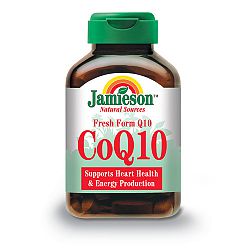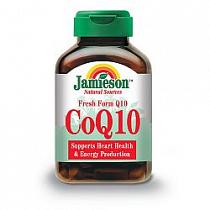Coenzyme Q10: Anti-Aging antioxidant, treats diverse conditions
Coenzyme Q10 (CoQ10) is a substance that' s found naturally in the body and helps convert food into energy. CoQ10 is found in almost every cell in the body, and it is a powerful antioxidant.
Antioxidants fight damaging particles in the body known as free radicals, which damage cell membranes, tamper with DNA, and even cause cell death. Scientists believe free radicals contribute to the aging process, as well as a number of health problems, including heart disease and cancer. Antioxidants, such as CoQ10, can neutralize free radicals and may reduce or even help prevent some of the damage they cause. Some researchers believe that CoQ10 may help with heart-related conditions, because it can improve energy production in cells, prevent blood clot formation, and act as an antioxidant. Some studies suggest that coenzyme Q10 supplements, either by themselves or in with other drug therapies, may help prevent or treat the following conditions: After Heart Attack One clinical study found that people who took daily CoQ10 supplements within 3 days of a heart attack were less likely to have subsequent heart attacks and chest pain. They were also less likely to die of heart disease than those who did not take the supplements. Anyone who has had a heart attack should talk with their health care provider before taking any herbs or supplements, including CoQ10. Heart failure (HF) There' s evidence that CoQ10 may help treat heart failure when combined with conventional medications. People who have congestive heart failure, where the heart isn' t able to pump blood as well as it should may also have low levels of CoQ10. Heart failure can cause blood to pool in parts of the body, such as the lungs and legs. It can also cause shortness of breath. Several clinical studies suggests that CoQ10 supplements help reduce swelling in the legs; reduce fluid in the lungs, making breathing easier; and increase exercise capacity in people with heart failure. But not all studies are positive -- some find no effect -- so using CoQ10 for heart failure remains controversial. CoQ10 should never be used by itself to treat heart failure, and you should ask your health care provider before taking it for this condition. High blood pressure Several clinical studies involving small numbers of people suggest that CoQ10 may lower blood pressure. However, it may take 4 - 12 weeks to see any change. In one analysis, after reviewing 12 clinical studies, researchers concluded that CoQ10 has the potential to lower systolic blood pressure by up to 17 mm Hg and diastolic blood pressure by 10 mm Hg, without significant side effects. More research with greater numbers of people is needed. Don' t try to treat high blood pressure by yourself -- see your health care provider for treatment. High cholesterol People with high cholesterol tend to have lower levels of CoQ10, so CoQ10 has been proposed as a treatment for high cholesterol, but so far there' s no evidence whether it works or not. There is some evidence it may reduce side effects from conventional treatment with cholesterol-lowering drugs called statins, which reduce natural levels of CoQ10 in the body. Taking CoQ10 supplements can bring levels back to normal. Plus, studies show that CoQ10 may decrease the muscle pain associated with statin treatment. Ask your health care provider if you are interested in taking CoQ10 with statins. Diabetes CoQ10 supplements may improve heart health and blood sugar and help manage high blood pressure in people with diabetes. Two studies found that 100 mg of CoQ10 twice daily improved A1c levels, a measure of long-term blood sugar control. But another study found no effect. If you have diabetes, talk to your doctor or registered dietitian before using CoQ10. Heart damage caused by chemotherapy Several clinical studies suggest that CoQ10 may help prevent heart damage caused by certain chemotherapy drugs, adriamycin, or other athracycline medications. More studies are needed, however. Talk to your health care provider before taking any herbs or supplements if you are undergoing chemotherapy. Heart surgery Clinical research indicates that introducing CoQ10 prior to heart surgery, including bypass surgery and heart transplantation, can reduce damage caused by free radicals, strengthen heart function, and lower the incidence of irregular heart beat (arrhythmias) during the recovery phase. You shouldn' t take any supplements before surgery unless your health care provider approves. Gum (Periodontal) disease Gum disease is a common problem that causes swelling, bleeding, pain, and redness of the gums. Clinical studies show that people with gum disease tend to have low levels of CoQ10 in their gums. A few studies with small numbers of people found that CoQ10 supplements led to faster healing and tissue repair, but the studies were not well designed. More research is needed. Other Preliminary clinical studies also suggest that CoQ10 may: -- Improve immune function in people with HIV or AIDS -- Increase sperm motility, improving male fertility -- Be used as part of the treatment for Parkinson's disease -- Improve exercise ability in people with angina -- Help prevent migraines Scientific studies are needed to see whether CoQ10 can be safely and effectively used for these health problems and needs. Dietary Sources: Primary dietary sources of CoQ10 include oily fish (such as salmon and tuna), organ meats (such as liver), and whole grains. Most people get enough CoQ10 through a balanced diet, but supplements may help people with particular health conditions (see "Uses" section) or those taking certain medications (see "Interactions" section). Available Forms: CoQ10 is available as a supplement in several forms, including soft gel capsules, oral spray, hard shell capsules, and tablets. CoQ10 is also added to various cosmetics. How to Take It: Pediatric Don' t give CoQ10 to a child under 18 except under the supervision of a health care provider. Adult For adults 19 years and older: The recommended dose for CoQ10 supplementation is 30 - 200 mg daily. Soft gels tend to be better absorbed than capsules or other preparations. Higher doses may be recommended for specific conditions. CoQ10 is fat-soluble, so it should be taken with a meal containing fat so your body can absorb it. Also, taking CoQ10 at night may help with the body's ability to use it. Precautions: Because of the potential for side effects and interactions with medications, you should take dietary supplements only under the supervision of a knowledgeable health care provider. Coenzyme Q10 appears to be generally safe with no major side effects, except occasional stomach upset. However, researchers haven' t done studies and don' t know if CoQ10 supplements are safe during pregnancy and breastfeeding. CoQ10 may lower blood sugar, so people with diabetes should talk with their health care provider before taking it to avoid the risk of low blood sugar. Possible Interactions: If you are being treated with any of the following medications, you should not use CoQ10 without first talking to your health care provider. Chemotherapy medications -- Researchers aren' t sure whether CoQ10' s antioxidant effect might make some chemotherapy drugs less effective. Always ask your oncologist before taking antioxidants or any supplement along with chemotherapy. Daunorubicin and doxorubicin -- CoQ10 may help reduce the toxic effects on the heart caused by daunorubicin (Cerubidin) and doxorubicin (Adriamycin), two chemotherapy medications that are used to treat several kinds of cancer. Always ask your oncologist before taking antioxidants or any supplement along with chemotherapy. Blood pressure medications -- CoQ10 may work with blood pressure medications to lower blood pressure. In a clinical study of people taking blood pressure medications, adding CoQ10 supplements allowed them to lower the doses of these medications. More research is needed, however. If you take medication for high blood pressure, talk to your health care provider before taking CoQ10, and don' t stop taking your regular medication. Blood-thinning medications -- There have been reports that CoQ10 may make medications such as warfarin (Coumadin) or clopidigrel (Plavix) less effective at thinning the blood. If you take blood thinners, ask your health care provider before taking CoQ10. Betaxolol (Betoptic) -- CoQ10 supplements may reduce the heart-related side effects of betaxolol drops (Betoptic), a beta-blocker medication used to treat glaucoma, without making the medication any less effective. Internet site reference: http://www.umm.edu/altmed/articles/coenzyme-q10-000295.htm
Comments
There are 0 comments on this post













